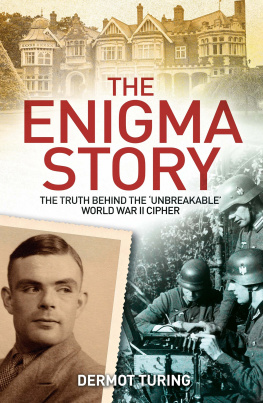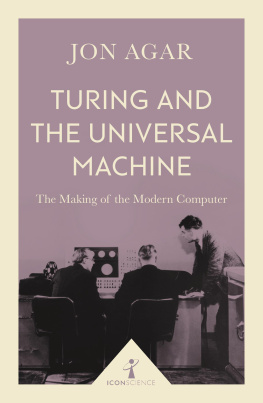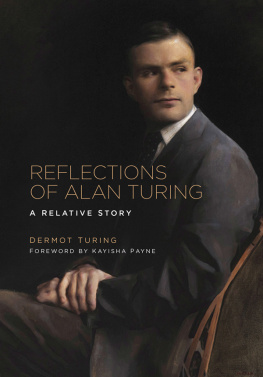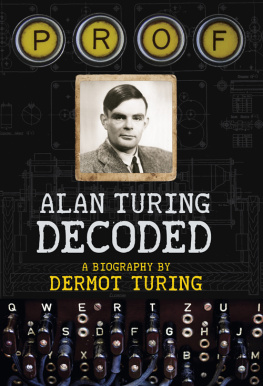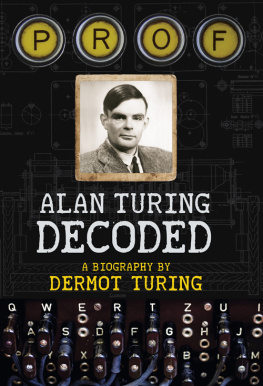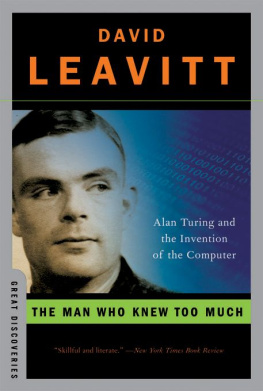Copyright 2020 by Michael Olinick
Cover Illustration by Jos Ramos
Cover Design by Scarlett Rugers
All rights reserved. No part of this publication may be reproduced, distributed, or transmitted in any form or by any means, including photocopying, recording, or other electronic or mechanical methods, without the prior written permission of the publisher, except in the case of brief quotations embodied in critical reviews and certain other noncommercial uses permitted by copyright law. For permission requests, write to the publisher at the address below.
ISBN: 978-1-943657-38-4
Brought to you by http://simplycharly.com
Contents
Simply Turing -- Simply Turing
1
Praise for Simply Turing
Simply Turing explores the nooks and crannies of Alan Turings multifarious life and interests, illuminating with skill and grace the complexities of Turings personality and the long-reaching implications of his work.
Charles Petzold, author of The Annotated Turing: A Guided Tour through Alan Turings Historic Paper on Computability and the Turing Machine
Michael Olinick has written a remarkably fresh, detailed study of Turings achievements and personal issues. Bravo!
Brian Winkel, Director of SIMIODE and Professor Emeritus of Mathematical Sciences at the United States Military Academy
Michael Olinick presents an impressive work, covering Turings early life, the wartime period of code-breaking, and his post-war life and death. Most touching was Turings request, as an adult, that his parents give him a teddy bear for Christmas, as he had never had one as a boy. On the war years, Olinick draws us methodically through a simple, clear history of codes and code-breaking, featuring Turings contributions. Most fascinating are Olinicks questions about Turings death: Was it a suicide, as the inquest declared, or a tragic accident? Or perhaps something more sinister? Perhaps we will never know.
Paul Wonnacott, Professor Emeritus of Economics, University of Maryland and Middlebury College
Michael Olinick has written a vibrant and absorbing biography of Alan Turing. Turings work as a cryptographer during WW II and his pioneering the development of the digital computer helped us win that war and make our technology-driven world of today possibleall this against the backdrop of the homophobic world Turing tried to navigate.
Joseph Malkevitch, Professor of Mathematics at York College (CUNY) and CUNY Graduate Center
As the father of the field of computer science, every aspect of Alan Turings life and work is important to us today as we benefit from his brilliant insights. Michael Olinicks book makes them all interesting and accessible. He highlights the development of Turings fascination with the biology of the human body and brain and the idea that they can be considered as complex machines. He shows how this idea formed the basis of much of Turings work and how his understanding of the mechanistic principles of biological systems coupled with his ability to think outside the box and his thorough understanding of mathematical principles informed and guided his developing ideas about how to design thinking machines that would ultimately lead to his universal computing machine. Reading Simply Turing is like walking alongside this fascinating man. Olinick has meticulously researched and clearly explained Turings life, his passions, and his work so that his personality comes alive, his brilliant creativity astounds and we come away feeling that we have lost a close and dear friend.
Tom Perera author of Inside Enigma and The Story of the Enigma and Professor Emeritus of Neuroscience at Montclair State University
Michael Olinick tells the story of Alan Turing in clear, energetic prose. Those who dont know Turings story will find Simply Turing to be a compelling introduction to one of the key pioneers of computer science, artificial intelligence, and logic. Olinick includes enough technical details, easily accessible to the undergraduate mathematics student, to help the reader understand the breadth and creativity of Turings contributions. Far from the conventional story of a colorful and misunderstood martyr, Simply Turing shows why Turing was a foundational figure in computer science and why the ultimate prize for innovation in computer science is named in his honor.
David Alan Grier, author of When Computers Were Human and Former President of IEEE Computer Society
-- Simply Turing
Simply Austen by Joan Klingel Ray
Simply Beckett by Katherine Weiss
Simply Beethoven by Leon Plantinga
Simply Chekhov by Carol Apollonio
Simply Chomsky by Raphael Salkie
Simply Chopin by William Smialek
Simply Darwin by Michael Ruse
Simply Descartes by Kurt Smith
Simply Dickens by Paul Schlicke
Simply Dirac by Helge Kragh
Simply Einstein by Jimena Canales
Simply Eliot by Joseph Maddrey
Simply Euler by Robert E. Bradley
Simply Faulkner by Philip Weinstein
Simply Fitzgerald by Kim Moreland
Simply Freud by Stephen Frosh
Simply Gdel by Richard Tieszen
Simply Hegel by Robert L. Wicks
Simply Hitchcock by David Sterritt
Simply Joyce by Margot Norris
Simply Machiavelli by Robert Fredona
Simply Napoleon by J. David Markham & Matthew Zarzeczny
Simply Nietzsche by Peter Kail
Simply Proust by Jack Jordan
Simply Riemann by Jeremy Gray
Simply Sartre by David Detmer
Simply Tolstoy by Donna Tussing Orwin
Simply Stravinsky by Pieter van den Toorn
Simply Wagner by Thomas S. Grey
Simply Wittgenstein by James C. Klagge
3
Series Editor's Foreword
S imply Charlys Great Lives series offers brief but authoritative introductions to the worlds most influential peoplescientists, artists, writers, economists, and other historical figures whose contributions have had a meaningful and enduring impact on our society.
Each book provides an illuminating look at the works, ideas, personal lives, and the legacies these individuals left behind, also shedding light on the thought processes, specific events, and experiences that led these remarkable people to their groundbreaking discoveries or other achievements. Additionally, every volume explores various challenges they had to face and overcome to make history in their respective fields, as well as the little-known character traits, quirks, strengths, and frailties, myths, and controversies that sometimes surrounded these personalities.
Our authors are prominent scholars and other top experts who have dedicated their careers to exploring each facet of their subjects work and personal lives.
Unlike many other works that are merely descriptions of the major milestones in a persons life, the Great Lives series goes above and beyond the standard format and content. It brings substance, depth, and clarity to the sometimes-complex lives and works of historys most powerful and influential people.


